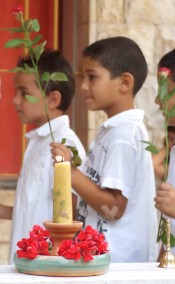Waldorf News
Co-existence or a Crime? Jewish-Arab Waldorf education earns parents a court date

By GIDEON LEVY and ALEX LEVAC
Parents at Ein Bustan, a Waldorf school in the lower Galilee where first and second grade classes don’t yet have Education Ministry approval, are summoned to court for breaking the Compulsory Education Law, which requires students to be enrolled in an accredited school.
Five couples whose children attend Ein Bustan, a Jewish-Arab school that follows the Waldorf method of teaching, have been summoned to the Court of Local Affairs in Kiryat Bialik and accused of breaking the Compulsory Education Law. The law requires parents to send their children to accredited educational institutions from the age of 5 up through 12th grade, and Ein Bustan, the Ministry says, does not qualify.
But this low-level court and the indictment against the parents conceal a far greater matter: The Education Ministry has decided to prosecute the parents for wanting to send their children to an Arab-Jewish Waldorf school that has not received the recognition required by law.
The prosecution of parents whose children attend a school unrecognized by the Education Ministry is a fairly common occurrence. Usually, the Education Ministry and local authorities try to talk with the parents to reach a compromise that will prevent legal action. The hard line taken against the Ein Bustan school in the Lower Galilee is unusual. A Waldorf school is one thing, but a school where Jewish and Arab children study together? It seems that the Education Ministry had difficulty dealing with so complex a situation.
The school, in which the non-profit organization Maayan Bustan runs the first and second grades, was established in 2005 by Arab and Jewish parents who wanted to send their children to a joint kindergarten. It is run according to the principles of Waldorf education, which takes a humanistic approach to educating the child based on the philosophy of Rudolf Steiner, the founder of anthroposophy. The kindergarten is located in the Arab village of Hilf, which belongs to the Basmat Tab’un local authority. Several years ago, the kindergarten received recognition, and funding, from the Education Ministry.
As time passed, Maayan Bustan expanded its work, and today about 50 children attend the school. The kindergarten expanded to include a nursery school for children 1 to 2 years old. About two years ago, the members of Maayan Bustan contacted officials in the Education Ministry’s northern district to obtain permission to open the school to first graders as a natural continuation of the kindergarten.

Amir Shlomian, chairman of Maayan Bustan, accuses the Education Ministry of purposely stalling to keep the first grade from opening. He claims that prosecuting the parents from Kiryat Tivon for “not fulfilling a parental obligation” is only the first stage in the battle that the Education Ministry is waging against Maayan Bustan and the parents. Ministry officials say that they behaved properly toward the organization and the parents, and that they acted exactly as the law requires.
Last year, Maayan Bustan opened an experimental first-grade class alongside the kindergarten. It had five pupils. When the current school year began, Maayan Bustan’s first-grade class had 17 new pupils, half of them Arabs (mostly from Basmat Tab’un) and half of them Jews (mostly from Kiryat Tivon). After Education Ministry representatives applied pressure and threatened an indictment, four Arab families pulled their children out of the school and sent them to a regular school. Ministry officials say that their representatives made no threats, but merely explained to the parents the importance of obeying the law. Incidentally, despite such importance, the law is being applied to only some of the parents of Ein Bustan.
The Basmat Tab’un local council, which supports the school, gave the parents a building that belonged to the Mifal Hapayis national lottery in the village of Zubeidat. Rifat Zubeidat of Basmat Tab’un is one of the parents that Education Ministry representatives tried to convince – without success – to put his children back into an ordinary public school. He says that in Ein Bustan, co-existence is more than a slogan. Moshe Vaknin of Kiryat Tivon, one of the parents who will be in court on Wednesday, says that he sent his daughter to Ein Bustan because of the Waldorf-style education available there, but decided to keep her there because of the bilingual and multicultural education.
“Coexistence has to go beyond the swimming pool in Kiryat Tivon that people from all over the area go to. I want this partnership, the connection between cultures, at the day-to-day level. We’re planting the seeds of something different here. I feel we’re pioneering something, and that’s why we are running into so many difficulties. I guess that’s part of the road we have to go on.”
This article originally appeared in Haaretz. To view the article at source, click here.
 Waldorf-inspired Homeschool Curriculum
Waldorf-inspired Homeschool Curriculum Middle School Science With Roberto Trostli
Middle School Science With Roberto Trostli Summer Programs - Culminating Class Trips
Summer Programs - Culminating Class Trips Quality Education in the Heartland
Quality Education in the Heartland Full-Time Teacher Education
Full-Time Teacher Education Association for a Healing Education
Association for a Healing Education Apply Today: New Cohort Starts Nov. 2025
Apply Today: New Cohort Starts Nov. 2025 Flexible preparation for your new grade
Flexible preparation for your new grade Jamie York Books, Resources, Workshops
Jamie York Books, Resources, Workshops Immersive Academics and Arts
Immersive Academics and Arts Transforming Voices Worldwide
Transforming Voices Worldwide Great books for Waldorf Teachers & Families
Great books for Waldorf Teachers & Families Roadmap to Literacy Books & Courses
Roadmap to Literacy Books & Courses The Journey is Everything
The Journey is Everything ~ Ensoul Your World With Color ~
~ Ensoul Your World With Color ~ Bay Area Teacher Training
Bay Area Teacher Training Caring for All Stages of Life
Caring for All Stages of Life
 Everything a Teacher Needs
Everything a Teacher Needs Waldorf Training in Australia
Waldorf Training in Australia Bringing Love to Learning for a Lifetime
Bringing Love to Learning for a Lifetime Train to Teach in Seattle
Train to Teach in Seattle Space speaks. Its language is movement.
Space speaks. Its language is movement. RSS Feeds
RSS Feeds